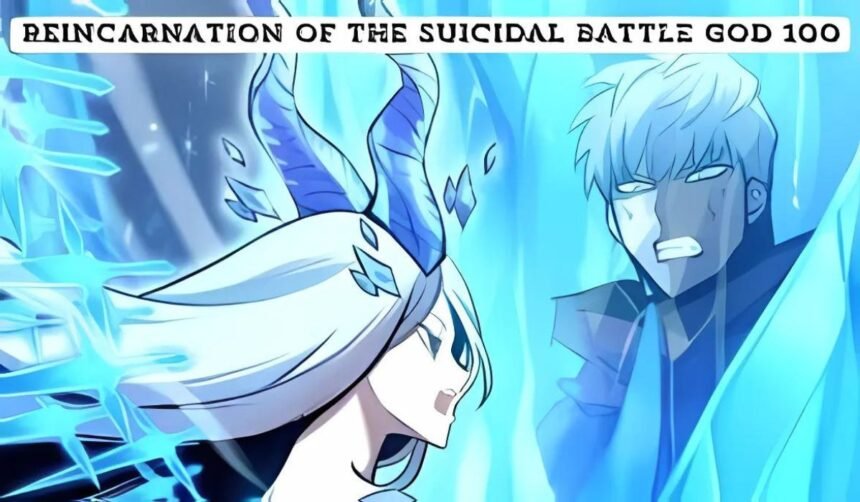Introduction:
The concept of reincarnation has fascinated humanity for centuries, often tied to themes of redemption, destiny, and the pursuit of a higher purpose. In the realm of anime and manga, this theme takes on a new and captivating form in the series Reincarnation of the Suicidal Battle God 100. With a unique blend of action, existential exploration, and mythological undertones, this series weaves a tale that resonates with fans of epic storytelling. Reincarnation of the Suicidal Battle God 100 combines intense combat, intricate world-building, and emotional depth to deliver a story of a once-mighty god who must confront his own past and seize a new chance at life.
This article delves into the captivating narrative, key characters, thematic richness, and the cultural impact of Reincarnation of the Suicidal Battle God 100. Whether you’re a seasoned fan or new to the series, this exploration will provide insights into why this story stands out in a crowded genre.
1. The Premise of Reincarnation of the Suicidal Battle God 100
At the heart of Reincarnation of the Suicidal Battle God 100 lies the story of a battle-hardened god who, after facing an endless cycle of violence and war, takes his own life. The god, who was once revered for his unmatched strength and tactical brilliance, succumbs to despair, overwhelmed by the futility of endless battles. However, instead of finding peace in death, he is reincarnated 100 times, each life giving him a new opportunity to reflect on his past mistakes, grow as a person, and confront his inner demons.
This narrative of rebirth is more than just a chance at redemption. Each reincarnation brings new challenges and moral dilemmas, forcing the protagonist to balance his desire for peace with his natural inclination toward conflict. The series explores profound questions about identity, fate, and the consequences of one’s actions over multiple lifetimes.
2. Themes of Redemption and Growth
One of the most compelling aspects of Reincarnation of the Suicidal Battle God 100 is its exploration of redemption. The god’s journey through his 100 lives is filled with moments of reflection on his past actions. In each life, he is presented with choices that mirror those he made before, offering him the chance to alter his fate.
The theme of redemption is not limited to the protagonist. Many characters throughout the series experience their own arcs of growth and atonement. Whether it’s a former enemy seeking forgiveness or an ally struggling with their own past, the story emphasizes that change and healing are possible, even in the most battle-worn souls.
3. The Battle God’s Inner Conflict
The central character of Reincarnation of the Suicidal Battle God 100 is a god of war, born for combat and steeped in the glory and tragedy of battle. His inner conflict is a core element of the narrative. In his initial life, he was a god driven solely by the desire to conquer and prove his might. However, as the cycles of reincarnation progress, he begins to question the purpose of endless fighting. Is there more to life than battle? Can peace ever be attained?
This internal struggle forms the backbone of the series. The protagonist’s journey is as much about mastering himself as it is about defeating external foes. His desire to escape the curse of eternal war is both a literal and metaphorical battle, reflecting the human condition’s struggle between violence and peace, despair and hope.
4. The Evolution of the World Across Reincarnations
In Reincarnation of the Suicidal Battle God 100, the world around the protagonist evolves with each reincarnation. The setting shifts through various time periods, cultures, and landscapes, reflecting the complexity of the universe the god inhabits. Each life places the protagonist in different environments—some familiar, others alien—forcing him to adapt to new realities and challenges.
The series takes a deep dive into world-building, creating a universe that feels expansive and lived-in. From ancient battlefields to futuristic realms, the world of Reincarnation of the Suicidal Battle God 100 is rich with history, magic, and political intrigue. The constantly changing world also serves as a metaphor for the protagonist’s internal transformation, with each new life representing a fresh perspective on the nature of existence.
5. Key Characters and Their Role in the Story
While the titular suicidal battle god is the central focus, Reincarnation of the Suicidal Battle God 100 features a diverse cast of supporting characters, each playing a crucial role in the protagonist’s journey. These characters come from all walks of life—warriors, scholars, rulers, and even gods. Some are allies who help the battle god on his path to redemption, while others serve as antagonists, challenging his resolve and forcing him to confront the darker aspects of his nature.
Notable characters include:
- The Oracle: A mysterious figure who seems to know more about the god’s past and future than he does. She guides him in subtle ways, offering cryptic advice that often leads to deeper self-discovery.
- The Betrayer: A former ally who turned against the battle god in one of his previous lives. Their complicated history adds tension and complexity to the storyline, especially as the god must decide whether to seek revenge or forgiveness.
- The Warrior King: A powerful ruler who initially seeks to use the battle god’s power for his own ends but eventually becomes a friend and confidant, offering wisdom that helps the protagonist evolve.
These characters serve as mirrors to the battle god’s own struggles, highlighting different aspects of his personality and adding depth to the overall narrative.
6. The Importance of Combat in the Story
Combat is at the heart of Reincarnation of the Suicidal Battle God 100, not only as a source of action and excitement but as a key element of the protagonist’s journey. Each battle is more than just a physical confrontation—it is a test of the god’s growth and understanding of his purpose. As the story progresses, the god’s fighting style evolves, reflecting his changing mindset and growing wisdom.
The battles are expertly crafted, blending strategy, raw power, and emotional stakes. Fans of high-stakes combat will find plenty to enjoy in the series, with each fight pushing the characters to their limits.
7. Exploring the Concept of Fate and Free Will
A recurring theme in Reincarnation of the Suicidal Battle God 100 is the tension between fate and free will. The god’s repeated reincarnations raise questions about whether his life is predetermined or if he has the power to change his destiny. Throughout the series, the protagonist grapples with this philosophical dilemma, wondering if his cycle of rebirth is a punishment, a lesson, or an opportunity.
The exploration of fate ties into the series’ larger themes of redemption and self-discovery. Each reincarnation offers the god a chance to rewrite his story, but only if he has the strength and wisdom to break free from the patterns of his past.
8. Mythological and Cultural Influences
Reincarnation of the Suicidal Battle God 100 draws inspiration from various mythological and cultural traditions, blending elements of Eastern and Western mythologies. The concept of gods being reborn, the endless cycle of life and death, and the existential struggles of immortal beings are all common themes in mythology, and the series incorporates these ideas in a fresh and exciting way.
The story also touches on Buddhist and Hindu philosophies of reincarnation, karma, and enlightenment, offering a rich tapestry of ideas for viewers to engage with on a deeper level.
9. The Emotional Core of the Series
At its core, Reincarnation of the Suicidal Battle God 100 is a deeply emotional story. The protagonist’s journey is not just about becoming stronger physically, but about healing from the emotional scars of his past. His struggle with despair, loneliness, and the search for meaning in an endless cycle of life and death gives the series a poignant depth.
Fans of character-driven stories will find much to appreciate in the battle god’s internal struggles, as well as in the relationships he forms with others across his many lives.
10. Why Reincarnation of the Suicidal Battle God 100 Stands Out
In a genre saturated with tales of reincarnation and godly battles, Reincarnation of the Suicidal Battle God 100 stands out due to its unique combination of action, philosophical depth, and emotional resonance. The series balances thrilling combat scenes with thought-provoking explorations of identity, purpose, and redemption, creating a story that appeals to both fans of high-octane action and those seeking deeper meaning.
Conclusion:
Reincarnation of the Suicidal Battle God 100 is more than just a tale of epic battles and divine powers. It is a story of self-discovery, redemption, and the search for meaning in an ever-changing world. The protagonist’s journey through 100 reincarnations serves as a powerful metaphor for the human experience, offering valuable lessons about growth, forgiveness, and the power of choice. Whether you’re drawn to the series for its intense combat or its philosophical undertones, there is no denying the impact of Reincarnation of the Suicidal Battle God 100 on the world of anime and manga.










